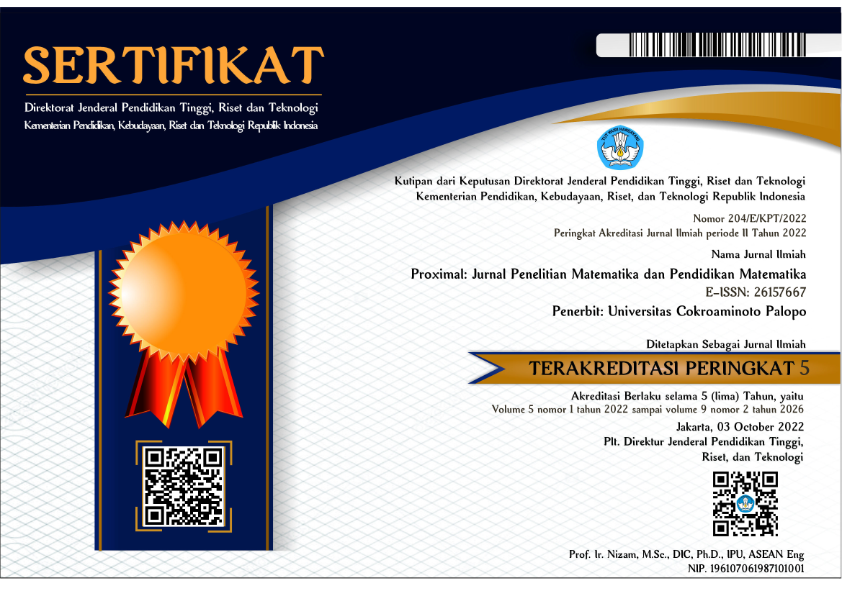Persepsi Siswa tentang Penerapan Project Based Learning dengan Pendekatan STEAM Pada Pembelajaran Mateamtika
DOI:
https://doi.org/10.30605/proximal.v8i2.6209Abstract
Artikel ini membahas penerapan Project Based Learning (PjBL) dengan pendekatan STEAM (Science, Technology, Engineering, Arts, Mathematics) dalam pembelajaran matematika di SMP Negeri 26 Makassar, khususnya pada kelas 7. Tujuan utama dari penelitian ini adalah untuk menggali persepsi siswa terhadap penilaian lingkungan pembelajaran berbasis situasi yang diterapkan dalam pembelajaran matematika yang berfokus pada pengembangan kemampuan penalaran dan pembuktian matematika. Penelitian ini menggunakan metode kualitatif deskriptif, dengan pengumpulan data melalui observasi langsung, wawancara, dan dokumentasi hasil proyek siswa. Dalam implementasi PjBL, siswa diminta untuk membuat sketsa eco-park city, dengan minimal 4 bangun datar yang dilengkapi dengan perhitungan luas dan kelilingnya, sambil mengintegrasikan unsur-unsur STEAM yang ramah lingkungan dalam desain mereka. Hasil penelitian menunjukkan bahwa meskipun penerapan metode ini memberikan kesempatan bagi siswa untuk menerapkan keterampilan matematika dalam proyek nyata, tantangan seperti keterbatasan waktu (40 menit per pertemuan) dan kurangnya media visual untuk mendukung pembelajaran membuat efektivitas penerapan kurang maksimal. Berdasarkan temuan tersebut, disarankan untuk memberikan lebih banyak waktu untuk proyek dan meningkatkan penggunaan media visual agar dapat meningkatkan keterlibatan siswa dan hasil pembelajaran. Penelitian ini memberikan wawasan penting mengenai penerapan PjBL-STEAM dalam pembelajaran matematika, serta tantangan yang dihadapi dalam implementasinya di SMP.
Downloads
Downloads
Published
How to Cite
Issue
Section
License
In submitting the manuscript to the journal, the authors certify that:
- They are authorized by their co-authors to enter into these arrangements.
- The work described has not been formally published before, except in the form of an abstract or as part of a published lecture, review, thesis, or overlay journal.
- That it is not under consideration for publication elsewhere,
- That its publication has been approved by all the author(s) and by the responsible authorities – tacitly or explicitly – of the institutes where the work has been carried out.
- They secure the right to reproduce any material that has already been published or copyrighted elsewhere.
- They agree to the following license and copyright agreement.
License and Copyright Agreement
Authors who publish with this journal agree to the following terms:
- Authors retain copyright and grant the journal right of first publication with the work simultaneously licensed under Creative Commons Attribution License (CC BY 4.0) that allows others to share the work with an acknowledgment of the work's authorship and initial publication in this journal.
- Authors are able to enter into separate, additional contractual arrangements for the non-exclusive distribution of the journal's published version of the work (e.g., post it to an institutional repository or publish it in a book), with an acknowledgment of its initial publication in this journal.
- Authors are permitted and encouraged to post their work online (e.g., in institutional repositories or on their website) prior to and during the submission process, as it can lead to productive exchanges, as well as earlier and greater citation of published work.















